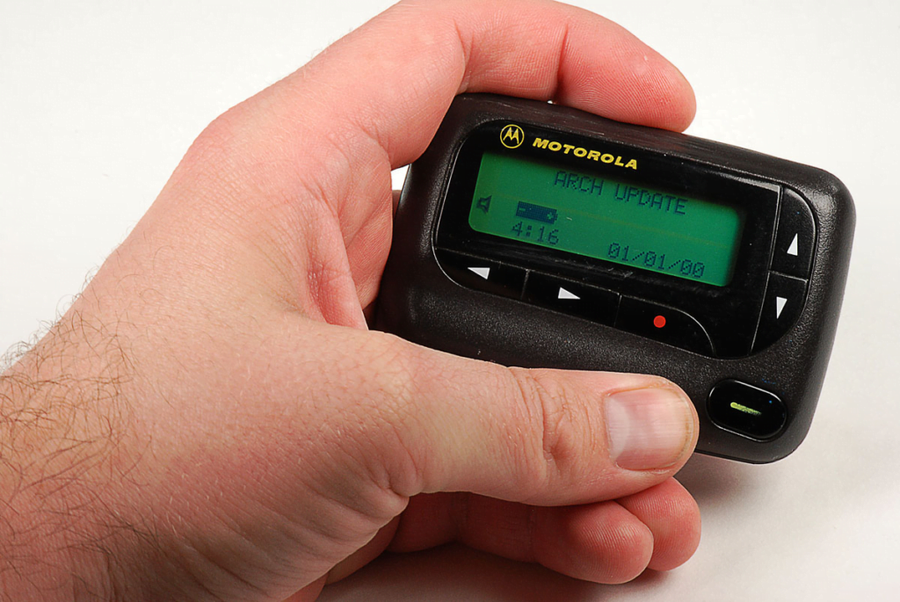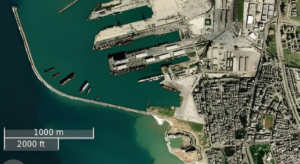Hezbollah Pagers Explode in Apparent Attack Across Lebanon

BEIRUT—Pagers carried by thousands of Hezbollah operatives exploded at about the same time Tuesday afternoon in what appeared to be an unprecedented attack that authorities said injured more than 2,700 and killed eight across Lebanon.
People familiar with the matter said the affected pagers were from a new shipment that the group received in recent days. A Hezbollah official said hundreds of fighters had such devices, speculating that malware may have caused them to explode. The official said some people felt the pagers heat up and disposed of them before they burst.
Hezbollah said several pagers carried by its members exploded simultaneously at 3:30 p.m. It couldn’t immediately be determined what caused the blasts, which were spread out across the country in several areas where Hezbollah has a heavy presence.
Hezbollah and the Lebanese government blamed Israel for the attack. Both said civilians were killed, and Hezbollah threatened to retaliate. The Israeli military declined to comment.
Iranian state television said the country’s ambassador to Lebanon, Mojtaba Amani, was injured by his pager but was conscious and not in danger. Iran is the main supporter of Hezbollah, a U.S.-designated terrorist group that has grown into one of the world’s best-armed nonstate militias.
The apparent attack comes amid growing concerns that tensions along the Lebanese border are in danger of escalating as the daily exchange of cross-border fire grows in intensity and efforts to calm regional tensions by striking a deal to pause the fighting in Gaza fail to bear fruit.
Israel’s government is under increasing pressure to return tens of thousands of evacuees to their homes in the north by silencing Hezbollah’s rockets and drones. Defense Minister Yoav Gallant said Monday that dimming prospects for diplomacy were leaving military action as the only alternative.
Hezbollah nodded to what it called threatening speeches and comments from Israel and said its forces were at the highest level of readiness to defend Lebanon.
Randa Slim, director of the Conflict Resolution and Track II Dialogues Program at the Middle East Institute, a think tank in Washington, D.C., said the attack against Hezbollah operatives is historic in its scope and manner, one that took significant planning and preparation.
“It sends a significant message to Hezbollah leadership that, ‘We can get you anywhere,’” said Slim. “And it very much affects morale.”
“The war on the border is no longer on the border—with this attack it has expanded into their homes and shopping places around Lebanon,” Slim said.
The number of casualties was rising too quickly to count through the afternoon. Hezbollah seemed overwhelmed trying to keep up, and hospitals across the country struggled to treat the injured. Downtown Beirut was filled with the sirens of ambulances wailing by.
Lebanon’s Internal Security Forces said certain types of wireless communication devices had exploded in various parts of the country, with a heavy concentration in Beirut’s southern suburbs. They called on citizens to clear the roads to facilitate the transportation of the injured to hospitals.
Lebanese Health Minister Firas Abiad, appearing on Al Jazeera television, said exploding pagers across the country injured 2,750 people and killed eight, including a child. The government said hundreds of people were in critical condition.
He said the number of emergency room admissions in southern Lebanon, a Hezbollah stronghold, was extremely high. Wounds included severed fingers, head injuries and large gashes to people’s torsos.
He said he didn’t know how and why the explosions happened, adding that many medical staff had got rid of their pagers fearing a second wave of detonations.
The explosions of devices in Lebanon looked like the type of operation conducted by Israel’s intelligence agency, said Ronen Solomon, an independent intelligence analyst.
“What we see now in Lebanon is an effort by something like the Mossad,” said Solomon, who specializes in understanding Israeli operations against Hezbollah and Iran. Israel likely wanted to deliver a message that it has a unique ability to attack, he said.
Michael Horowitz, the head of intelligence at Le Beck International, a security and risk management consulting firm based in the Middle East, said the cause was likely malware that caused the pagers’ batteries to overheat and explode or a charge placed in the devices and detonated remotely.
“Either way, this is a very sophisticated attack,” he said. “Particularly if this is a physical breach, as this would mean Israel has access to the producer of those devices. This may be part of the message being sent here.”
Israel has previously exploited communications devices to carry out targeted killings. After being rocked by a series of suicide bombings in the 1990s, Israel killed Hamas bomb-maker Yahya Ayyash by placing an explosive in a phone that was detonated next to his ear.
Hezbollah acknowledged the vulnerability of its communication networks earlier in the war. In February, the group’s leader, Hassan Nasrallah, urged its fighters to get rid of their smartphones, saying Israel could use them for surveillance or targeting.
“This phone is in our hands. What is in your hand? I do not have a phone in my hand,” he said.
The attack comes amid growing tension along Lebanon’s border with Israel. Hezbollah began firing rockets into Israel soon after the Hamas-led Oct. 7 attacks on southern Israel that set off the war in Gaza. The two sides have exchanged fire daily since then, driving tens of thousands of people out of towns on both sides of the border and leaving hundreds of Hezbollah operatives dead.
On Tuesday, Israel’s internal security service Shin Bet said that it had thwarted a bombing attack by Hezbollah targeting a former senior official in Israel’s security establishment. The agency said the attack was expected to be carried out in the coming days. It said that an explosive it discovered was similar to another one found in September 2023 that was also intended to target a senior Israeli official. Hezbollah hasn’t commented on the allegation.
Israel has conducted a number of high-profile intelligence operations in and around Lebanon since the war began. In late July, Israel killed top Hezbollah commander Fuad Shukr in an airstrike in Beirut, taking out a militant who had eluded pursuers for four decades in what was seen as a deep intelligence breach of the group. Earlier in the year, Saleh al-Arouri, a founding member of Hamas, was killed in Beirut in a suspected Israeli strike.
Last week, Israel carried out an ambitious commando raid in Syria to destroy a suspected Iranian military facility supplying Hezbollah, U.S. officials said.
Rory Jones and Omar Abdel-Baqui contributed to this article.








